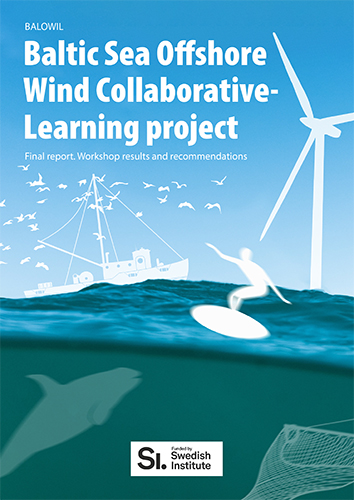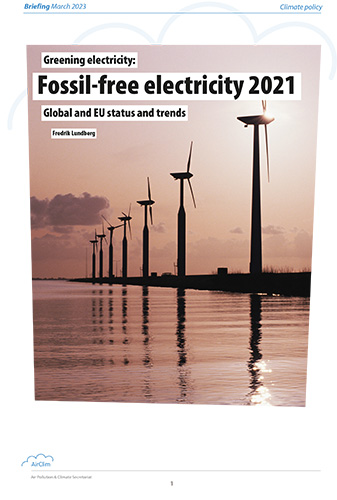
Shipping should cut greenhouse gases and air pollutants
 Photo: Pierre Lesage/flickr.com/CC BY-NC-ND
Photo: Pierre Lesage/flickr.com/CC BY-NC-ND
Due to its dependence on fossil fuels and the fact that it is one of the least regulated emission sources, emissions from the marine transport sector contribute significantly and increasingly to air pollution and climate change.
Emissions of air pollutants and greenhouse gases from the shipping sector have increased substantially in the last two decades, contributing to both climate change and air pollution problems, according to a report1 from the European Environment Agency (EEA).
The sector’s environmental impact is significant as emissions such as carbon dioxide (CO2), nitrogen oxides (NOx), sulphur dioxide (SO2) and particulate matter (PM2.5) from shipping occurring in European waters can contribute up to 10–20 per cent of overall worldwide shipping emissions. When considering all ship traffic from national and international shipping arriving or departing from EU ports the contribution can be up to 30 per cent for CO2.
Air pollutants emitted by shipping can affect air quality in many areas, particularly around ports and busy shipping channels. The release of greenhouse gases and air pollutants from international shipping has a complex effect on the climate – greenhouse gas emissions have a warming effect, while on the other hand some air pollutants lead to cooling.
To systematically address both types of emissions together there is a need for an integrated EU-wide monitoring, reporting and verification system for emissions of both greenhouse gases and air pollutants from international shipping in European waters, the report says.
Compared to other economic sectors, shipping is currently one of the most unregulated sources of air pollutant emissions. Air pollution from shipping harms health, increasing heart disease, respiratory illnesses and premature deaths. It also damages the environment through acidification and eutrophication.
While some air pollutants are emitted far from land, more than two-thirds of the global emissions from ships are within 400 km of coastlines, and this rate is much higher in European waters. Moreover, some pollutants from ships can travel hundreds of kilometres in the atmosphere.
In some areas, ships can contribute up to 20–30 per cent of the local fine particulate matter (PM2.5) concentrations and up to 15 per cent for ground-level ozone. Around some busy ports and shipping channels, ships can contribute as much as 80 per cent of NOx and SO2 pollution. The report highlights that there is relatively little measurement data available to attribute shipping’s contribution to local air pollution, although there are some modelling studies.
The report includes a review of recently developed scenario studies on ship emissions and shows that NOx emissions from international maritime transport in European waters are expected to continue to increase and could be equal to land-based emissions sources from 2020 onwards. SO2 emissions in European waters will decrease further from 2020 onwards due to already adopted legislation on the sulphur content in fuel. It is expected that the sulphur standards will also lead to a decrease in emissions of PM2.5.
Regarding carbon emissions, national and international shipping was in 2007 responsible for 3.3 per cent of global CO2 emissions – and around 30 per cent of this was emitted on routes passing through European ports. Emissions from the sector are projected to grow by up to four per cent per year over the next decade.
As there is a clear link between economic growth and the movement of goods, emissions from shipping currently change largely in step with the level of economic activity. Between 1990 and 2010, emissions of CO2 from international shipping departing from EU ports increased by approximately 35 per cent.
Emissions of greenhouse gases and air pollutants from international maritime transport contribute to climate forcing in a rather complex manner. This can come via a variety of processes such as the absorbing (leading to a warming effect) or scattering of radiation (leading to a cooling effect) as well as influencing cloud formation over oceans (cooling, the so-called indirect aerosol effect) and depositing black carbon on snow and ice (warming). The net warming or cooling effect of global ship emissions is rather uncertain but most recent studies indicate that currently at a global level, the indirect aerosol effect (cooling) is more important than the warming.
Reducing fuel consumption, including by reducing speed, is the best way to reduce emissions, according to the report. Better fuel efficiency can cut both air pollution and greenhouse gases, and the report recommends technical improvements and different ship operating procedures. If ships reduced their speed by 10 per cent, known as ‘slow steaming’, it could cut energy demand by approximately 19 per cent, taking into account reduced engine power and increased travel time, according to one study.
The need and potential for ships to switch to renewable fuels are not mentioned in the report, but it is noted that some shipping sectors are already switching to liquid natural gas (LNG), leading to an eradication of SO2 emissions, 90 per cent reduction of NOx and 20 per cent reduction of greenhouse gases. Exhaust gas cleaning technologies, such as seawater scrubbing to reduce SO2 emissions or selective catalytic reduction (SCR) of NOx, can also significantly reduce air pollutants.
Jacqueline McGlade, EEA Executive Director, said: “This study shows the complex effects different emissions are having on the planet. We need initiatives that protect the environment as an overall system. The choice between either clean air or mitigating climate change is a false dichotomy – Europe needs both. By avoiding unnecessary movement of goods and improving transport efficiency, we can address both air pollution and greenhouse gas mitigation together.”
Christer Ågren
1 The impact of international shipping on European air quality and climate forcing (March 2013). EEA Technical Report No 4/2013.

 Download this issue
Download this issue

























